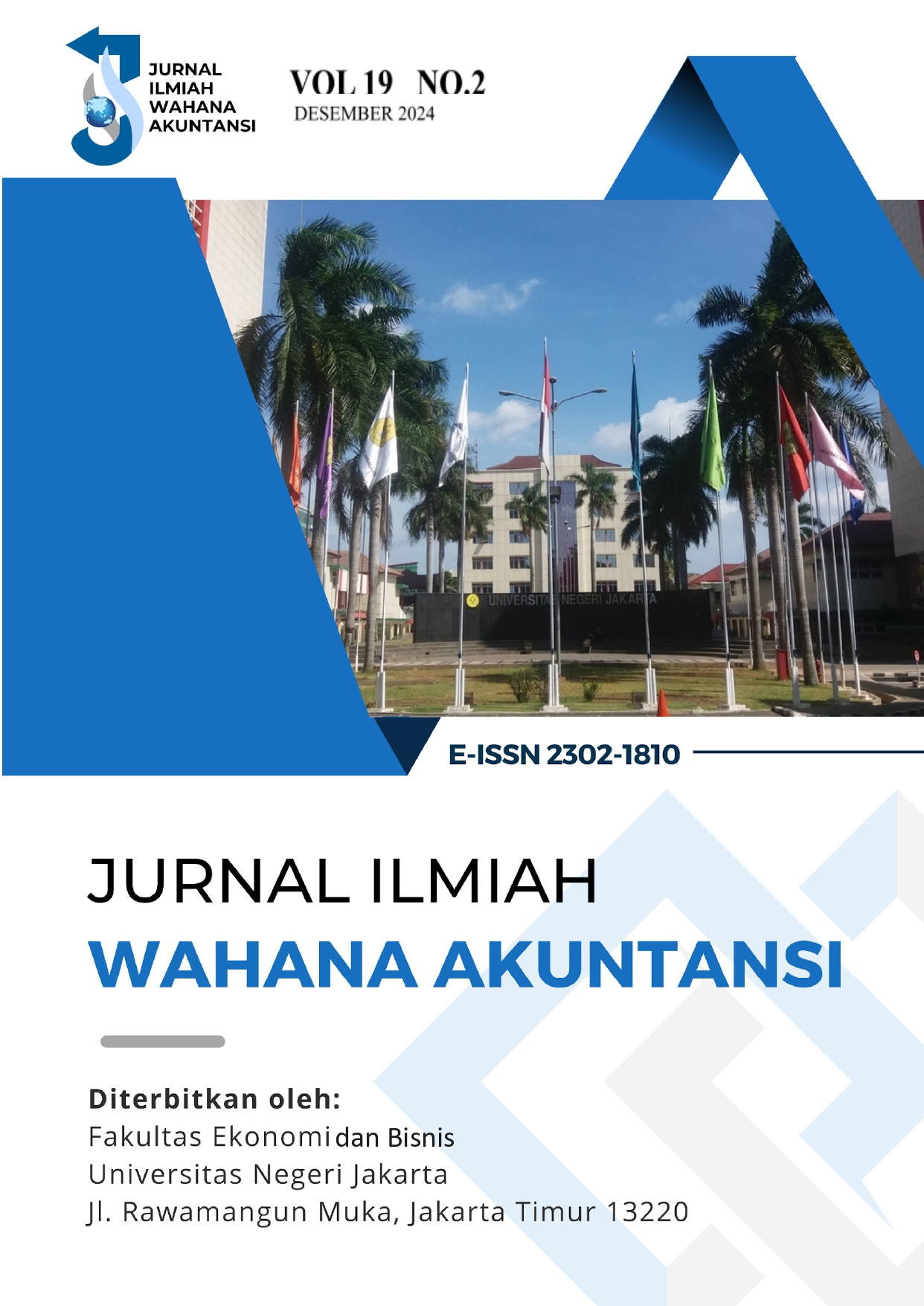Standar Akuntansi Keuangan untuk Pengelolaan Lingkungan di Sektor FMCG: Kajian PSAK yang Relevan
DOI:
https://doi.org/10.21009/wahana.19.0211Keywords:
Sustainability, Ekonomi Sirkular, FMCG, PSAKAbstract
The Fast-Moving Consumer Goods (FMCG) industry faces major challenges related to plastic waste, resource consumption, and carbon emissions. With the increasing global awareness of sustainability, FMCG companies are encouraged to transform through the circular economy, eco-friendly packaging innovation, and recycling technologies. The implementation of accounting standards such as PSAK 1, PSAK 16, PSAK 57, and PSAK 68 is crucial in ensuring transparency and accountability of environmental management. This study analyzes how these standards support the management of environmental obligations in the FMCG sector. The results show that the adoption of PSAK not only improves the transparency of financial reports but also drives the reduction of waste and carbon emissions. Sustainability reports based on PSAK improve corporate reputation and consumer trust. However, environmental regulations in Indonesia, such as Presidential Regulation No. 83 of 2018 and Law No. 32 of 2009, are still weak in implementation and enforcement, thus hampering investment in green technology. The lack of supervision worsens the situation, making companies less compliant with financial reporting and environmental responsibilities. This study recommends strengthening regulations, law enforcement, and adoption of international standards to encourage compliance and sustainability in the FMCG sector. The combination of innovation, PSAK compliance, and social commitment is the key to long-term sustainability.
References
Afriani, F. S. (2023). Analysis of the Implementation of PSAK 01 regarding the Presentation of Financial Reports at the Sherlina Oriflame Agent Marpoyan Pekanbaru. Nexus Synergy: A Business Perspective, 1(3), 109–137.
Aureli, S., Del Baldo, M., Lombardi, R., & Nappo, F. (2020). Nonfinancial reporting regulation and challenges in sustainability disclosure and corporate governance practices. Business Strategy and the Environment, (29), 2509–2525. https://doi.org/10.1002/bse.2509.
Azizah, N. N., Aulia, R., Parwati, S. D., & Panggiarti, E. K. (2023). Analisis penerapan PSAK 16 tentang perlakuan akuntansi aset tetap pada perusahaan di Indonesia. Jurnal Rimba: Riset Ilmu Manajemen Bisnis dan Akuntansi, 2(1), 37–43. https://doi.org/10.61132/rimba.v2i1.528
Babatunde, A. I. (2020). An assessment of the triple bottom line concept on CSR effort in FMCG in Nigeria. Electronic Research Journal of Social Sciences and Humanities, 1(II), 123–147.
Baginda, A. N., Fauzi, A., Yulius Caesar, L. A., Iswanto Putra, A. W., Aadilah Atriliano, R., Larasati, S., & Nur Utami, S. (2023). Analisis Strategi Keberlanjutan pada Perusahaan Unilever. Jurnal Ilmu Manajemen Terapan, 5(3), 208–217. https://doi.org/10.38035/jimt.v5i3.1736.
Bhadra, U., & Mishra, P. P. (2021). Extended producer responsibility in India: Evidence from Recykal, Hyderabad. Journal of Urban Management, 10(4), 430–439. https://doi.org/10.1016/j.jum.2021.07.003
Buana, D. I., Karmawan, & Anggita, W. (2024). Pengaruh profitabilitas, likuiditas, struktur aset, dan pertumbuhan penjualan terhadap struktur modal pada perusahaan sektor consumer goods industry yang terdaftar di Bursa Efek Indonesia tahun 2019-2022. Jurnal EMT KITA, 8(1), 355–371. https://doi.org/10.35870/emt.v8i1.2070.
Budianto, R. O., & Ghanistyana, L. P. (2024). Peran komunikasi politik dalam kampanye isu lingkungan: Studi kasus pada kebijakan pengelolaan sampah di Indonesia. Jurnal Bisnis Dan Komunikasi Digital, 2(1), 11. https://doi.org/10.47134/jbkd.v2i1.3219.
Carroll, A. B. (2021). Corporate social responsibility: Perspectives on the CSR construct’s development and future. Business & Society, 60(6), 1258–1278. https://doi.org/10.1177/00076503211001765
Chen, Y., Awasthi, A. K., Wei, F., Tan, Q., & Li, J. (2021). Single-use plastics: Production, usage, disposal, and adverse impacts. Science of The Total Environment, 752, 141772. https://doi.org/10.1016/j.scitotenv.2020.141772.
Firdatama, A. A. (2023). Keterbandingan standar akuntansi sewa PSAK 73 sebelum dan setelah konvergensi IFRS. Akuntansi 45, 4(2), 347–354. https://doi.org/10.30640/akuntansi45.v4i2.1858.
Gong, Y., Putnam, E., You, W., & Zhao, C. (2019). Investigation into circular economy of plastics: The case of the UK fast moving consumer goods industry. Journal of Cleaner Production, (240), 118941. https://doi.org/10.1016/j.jclepro.2019.118941.
Hassan, M., Wahab, N. A. B. A., & Nor, R. B. M. (2023). The Role of Artificial Intelligence in Waste Reduction in the Beverage Industry: A Comprehensive Strategy for Enhanced Sustainability and Efficiency. AI, IoT and the Fourth Industrial Revolution Review, 13(11), 1–8. Retrieved from https://scicadence.com/index.php/AI-IoT-REVIEW/article/view/24.
Indonesia. (2022). Indonesia Menargetkan Kurangi Sampah Plastik hingga 70 Persen pada 2025. https://indonesia.go.id/kategori/kabar-terkini-g20/6194/indonesia-menargetkan-kurangi-sampah-plastik-hingga-70-persen-pada-2025?lang=1.
Kibria, M. G., Masuk, N. I., Safayet, R., & others. (2023). Plastic waste: Challenges and opportunities to mitigate pollution and effective management. International Journal of Environmental Research, 17(20). https://doi.org/10.1007/s41742-023-00507-z.
Kurniawan, A., & Gandakusuma, I. (2022). Faktor-faktor yang mempengaruhi rasio pembayaran dividen pada perusahaan FMCG (Fast Moving Consumer Goods 2016-2020). Fair Value: Jurnal Ilmiah Akuntansi Dan Keuangan, 5(1), 439–445. https://doi.org/10.32670/fairvalue.v5i1.2225.
Mahardika, D. P. K. (2020). Meninjau peran akuntan dalam menanggulangi isu perubahan iklim. Jurnal Akuntansi Multiparadigma, 11(3), 581–599.
Nugroho, T. P. (2024). Analisis perbandingan penerapan PSAK No. 2 terhadap laporan arus kas pada PT. Waskita Karya dan PT. Wijaya Karya periode 2018-2022. Jurnal Ekonomi Dan Manajemen, 3(2), 103–109. https://doi.org/10.56127/jekma.v3i2.1457
Purwanti, A., Rahim, I., Santoso, A., Nurul Ch, F., & Rusli, D. (2023). Basic concepts of fair value measurement: Analysis of PSAK 68. ProBisnis: Jurnal Manajemen, 14(5), 48–52. https://doi.org/10.62398/probis.v14i5.299.
Putri, D. S. (2023). Penegakan hukum terhadap dumping limbah padat bahan berbahaya beracun (B3) oleh para pelaku usaha berdasarkan Pasal 104 Undang-Undang Nomor 32 Tahun 2009. Dharmasisya: Jurnal Program Magister Hukum FHUI, 2(3).
Rahayu, P., & Septian, H. (2020). Pengakuan aset tak berwujud dan perbandingan metode garis lurus dengan metode saldo menurun dalam menentukan pajak penghasilan. JAS (Jurnal Akuntansi Syariah), 4(2), 242–257. https://doi.org/10.46367/jas.v4i2.253
Raodah, P., & Al Qindy, F. H. (2024). Aspek hukum mengenai tanggung jawab lingkungan oleh pelaku usaha di Indonesia. Innovative: Journal of Social Science Research, 4(1), 12297–12308. https://doi.org/10.31004/innovative.v4i1.8737.
Safirin, M. T., Samanhudi, D., Aryanny, E., & Pudji, W. E. (2023). Pemanfaatan teknologi packaging untuk meningkatkan kualitas dan keamanan produk pangan lokal. Jurnal Abdimas Peradaban, 4(1), 31–41. https://doi.org/10.54783/ap.v4i1.21.
Shahmohammadi, S., Steinmann, Z. J. N., Tambjerg, L., van Loon, P., King, J. M. H., & Huijbregts, M. A. J. (2020). Comparative greenhouse gas footprinting of online versus traditional shopping for fast-moving consumer goods: A stochastic approach. Environmental Science & Technology, 54(6), 3499–3509. https://doi.org/10.1021/acs.est.9b06252
Siregar, I. F., Rasyad, R., Lubis, N., & Onasis, D. (2024). Peran environmental audit pada sustainability reporting: State of the art review, trend saat ini pada negara berkembang. Akuntansi Kompetif, 7(2). https://doi.org/10.35446/akuntansikompetif.v7i2.1826
Sunyowati, D., Inayatun, I., & Camelia, A. I. (2022). Upaya keberlanjutan sumber daya perikanan terhadap ancaman sampah laut plastik di pesisir Kelurahan Kedungcowek - Surabaya. Panrita Abdi - Jurnal Pengabdian Pada Masyarakat, 6(3), 646–659. https://doi.org/10.20956/pa.v6i3.17876.
Susilo, D., Mendoza, C. M. T., & Khan, M. A. (2023). Sustainability in industry: The lack of implementation running in the FMCG industry. Jurnal Ekonomi Dan Bisnis Digital, 2(2), 461–476. https://doi.org/10.55927/ministal.v2i2.3850.
Yuwanti, D., Imaningsih, E. S., Wibowo, W., & Yuwono, I. (2023). Green product quality, green brand image, e-WOM terhadap green customer loyalty trust strategi marketing. Jurnal Impresi Indonesia (JII), 2(9), 1–12. https://doi.org/10.58344/jii.v2i9.3545871.
Downloads
Published
How to Cite
Issue
Section
License

Jurnal Ilmiah Wahana Akuntansi is licensed under a Creative Commons Attribution-NonCommercial-ShareAlike 4.0 International License.
Articles in Jurnal Ilmiah Wahana Akuntansi are Open Access articles published under the Creative Commons CC BY-NC-SA License. This license permits use, distribution and reproduction in any medium for non-commercial purposes only, provided the original work and source is properly cited. Any derivative of the original must be distributed under the same license as the original.











